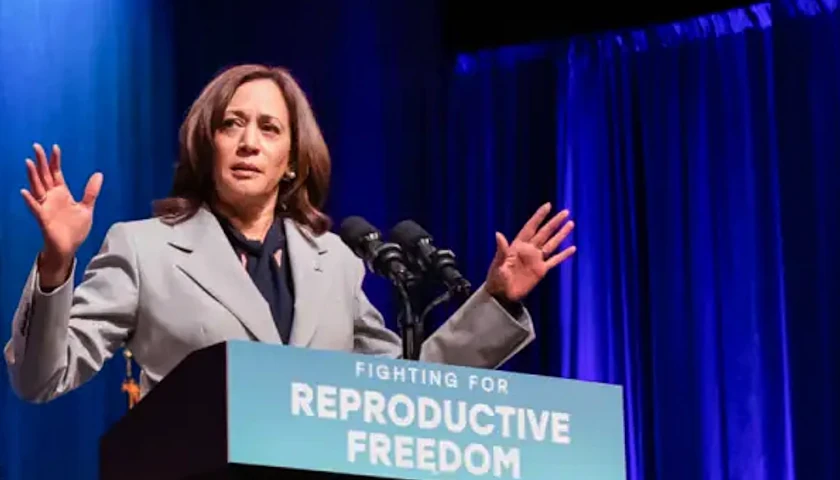by George Rasley, CHQ Editor
February 15, 2017
Reprinted with permission from ConservativeHQ.com
Emboldened by Judge James L. Robart’s anti-constitutional power grab and the refusal of the Ninth Circuit Court of Appeals to vacate his order temporarily restraining President Trump’s Executive Order 13,769 temporarily pausing immigration from seven terrorist hotspots Judge Leonie Brinkema, of the U.S. District Court for the Eastern District of Virginia has also chosen to seize the president’s Article II constitutional prerogatives. (To oppose this power grab please sign our Impeach Power Grabbing Judges Petition).
In a 22-page ruling Monday night, Judge Brinkema, said lawyers for President Trump had provided no evidence supporting the restriction of travel from seven majority-Muslim countries.
According to WTOP’s Neal Augenstein, Judge Brinkema said, “…they [the Trump administration] have not offered any evidence to identify the national security concerns that allegedly prompted this EO (executive order), or even described the process by which the president concluded that this action was necessary.”
The claim that the government has “not offered any evidence to identify the national security concerns that allegedly prompted this EO” is either incredibly bad pleading by the government’s lawyers, willful blindness on the part of Judge Brinkema – or an anti-constitutional power grab.
Last summer, Muna Osman Jama and Hinda Osman Dhirane, two Somali immigrants, were found guilty of conspiracy to provide material support to a foreign terrorist organization, and providing material support to a foreign terrorist organization after a bench trial in front of U.S. District Judge Anthony J. Trenga, right down the hall from Judge Brinkema’s court.
Somalia is a failed state that has no records that can be vetted to determine the identity or criminal history of anyone seeking entry to the United States and is one of the seven countries covered by President Trump’s Executive Order.
“Providing material support to foreign terrorist organizations is a very serious crime,” said Dana J. Boente, U.S. Attorney for the Eastern District of Virginia. “These women funneled money to a terrorist organization which was conducting a violent insurgency campaign in Somalia. National security is the top priority in this office and we will continue to work closely with our law enforcement partners to investigate and prosecute those who provide material support to terrorists.”
“In addition to money they transferred in direct support of al-Shabaab, these subjects recruited, solicited, and advised an online group located in multiple countries as to how and where to transfer funds to this terrorist organization,” said Paul M. Abbate, Assistant Director in Charge of the FBI’s Washington Field Office. “In coordination of the group, these subjects would then track and facilitate donations to ensure the money was received by their co-conspirators located in Nairobi and Somaliland. Today’s guilty verdicts send a message that facilitation of financial support to a designated terrorist organization equates to terrorist activity itself.”
Judge Nathaniel M. Gorton United States District Judge for the District of Massachusetts precisely refuted the arguments made by the plaintiffs in the case before Judge Brinkema. His ruling dismissing similar claims is found in the case of Louhghalam v. Trump:
There is a distinction, however, between the constitutional rights enjoyed by aliens who have entered the United States and those who are outside of it. See Zadvydas v. Davis, 533 U.S. 678, 693 (2001).
The decision to prevent aliens from entering the country is a “fundamental sovereign attribute” realized through the legislative and executive branches that is “largely immune from judicial control.” Chi Thon Ngo v. I.N.S., 192 F.3d 390, 395 (3d Cir. 1999), amended (Dec. 30, 1999) (quoting Shaughnessy v. United States ex rel. Mezei, 345 U.S. 206, 210 (1953)).
Federal classifications based on alien status are evaluated using rational basis review. Mathews v. Diaz, 426 U.S. 67, 83 (1976) (considering whether a law that made distinctions based on alien status was “wholly irrational”); Ruiz-Diaz v. United States, 703 F.3d 483, 486–87 (9th Cir. 2012) (determining that a regulation that treated immigrant religious workers differently than other visa applicants would be evaluated using rational basis review); Narenji v. Civiletti, 617 F.2d 745, 748 (D.C. Cir. 1979) (upholding a regulation issued in response to the Iran hostage crisis that required non-immigrant alien Iranian students to provide information to Immigration and Naturalization Services Offices).
Rational basis review examines whether the “classification at issue bears some fair relationship to a legitimate public purpose.” Plyler, 457 U.S. at 216. It is “not a license for courts to judge the wisdom, fairness, or logic of legislative choices.” Heller v. Doe by Doe, 509 U.S. 312, 319–20 (1993) (quoting FCC v. Beach Communications, Inc., 508 U.S. 307, 313 (1993)).
Under rational basis review, a classification is permissible “if there is any reasonably conceivable state of facts that could provide a rational basis.” Id. (quoting Beach Communications, 508 U.S. at 313).
Because the EO involves federal government categorizations with respect to non-resident aliens, rational basis review applies. According to the EO, its purpose is to ensure the proper review and maximum utilization of available resources for the screening of foreign nationals, and to ensure that adequate standards are established to prevent infiltration by foreign terrorists . . . .
Exec. Order 13,769 § 3(c). The EO specifically asserts that permitting aliens from the countries identified in section 217(a) of the INA, 8 U.S.C. § 1187(a)(12), to enter “would be detrimental to the United States.” The order provides a reasonably conceivable state of facts [which concerns national security and] that could provide a rational basis for the classification. Heller, 509 U.S. at 319–20.
Accordingly, this Court declines to encroach upon the “delicate policy judgment” inherent in immigration decisions. Plyler, 457 U.S. at 225.
Judge Gorton also found that, “In light of the government’s clarification that the EO will not be applied to lawful permanent residents, the claims for injunctive relief by plaintiffs Louhghalam, Tootkaboni, Sanie, Fatemeh Moghadam and Babak Moghadam are moot. With respect to those individuals, there is “no ongoing conduct to enjoin”. Town of Portsmouth v. Lewis, 813 F.3d 54, 58 (1st Cir. 2016). Thus, any declaration with respect to the lawfulness of the EO would be strictly advisory. See New Eng. Reg’l Council of Carpenters v. Kinton, 284 F.3d 9, 18 (1st Cir. 2002) (remarking that it would be “pointless” to declare the constitutionality of a policy that had been revised during litigation).
If terrorism, as proven in the same court house where Judge Brinkema sits on the bench, isn’t a “rational basis” for President Trump’s Executive Order 13,769 then what, in the Judge’s eyes, would justify pausing immigration from a country known to harbor people hostile to the United States?
The answer, of course, is that it is not Judge Brinkema’s role in our federal republic to make such decisions, it is the President’s constitutional prerogative to do so.
The behavior of Judge Robart and Judge Brinkema clearly falls under “high crimes and misdemeanors,” offenses that the US Constitution explicitly defines as grounds for removal of a judge through impeachment. The time is now for the House of Representatives to act with the authority vested in it by the Constitution and remove Federal District Judge James L. Robart of the Western District of Washington and Judge Leonie Brinkema, of the U.S. District Court for the Eastern District of Virginia, from the bench.
We urge CHQ readers to join us in demanding that Representative Robert Goodlatte (VA-6) Chairman of the House Judiciary Committee immediately holding hearings on the impeachment of Judge James L. Robart and Judge Leonie Brinkema by signing our Impeach Power Grabbing Judges Petition.






[…] Brinkema issued a similar, though less widely reported, […]